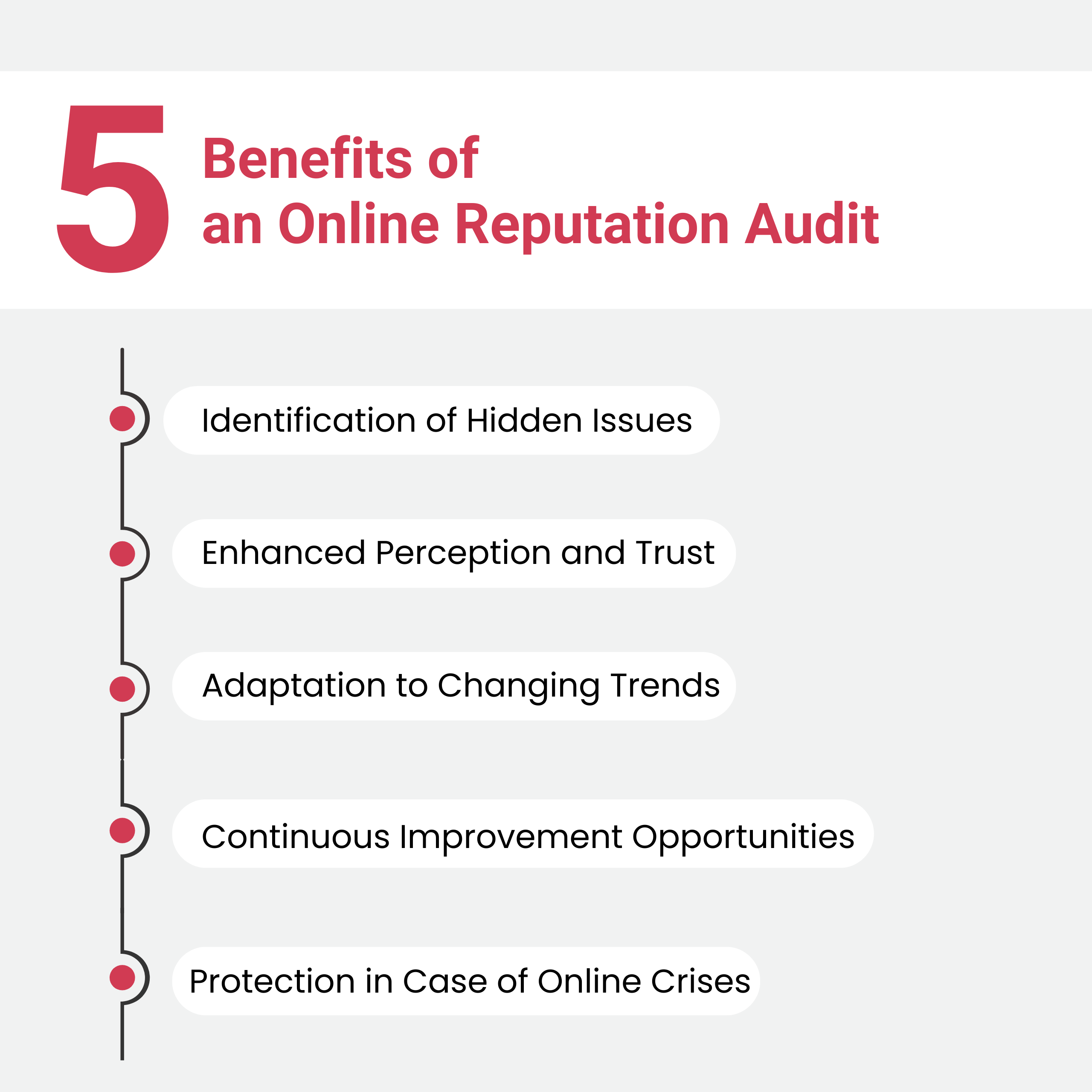Online Reputation Audit: 10 Steps to Evaluate Your Reputation

In the digital era we live in, our online presence has become an invaluable asset. Whether you run a small business, a growing startup, or a large corporation, your online reputation is a key element for success. This is where the "Online Reputation Audit" comes into play, an essential tool to assess, manage, and enhance how you're perceived in the digital world.
You're probably wondering, what exactly is an online reputation audit, and why should it matter to me? Allow us to clarify all your doubts. In this article, we'll take you on an informative journey that will help you understand the significance of this practice and how it can benefit you both personally and professionally.
From managing your personal or company profiles on social media to monitoring online reviews and optimizing your visibility on search engines, online reputation auditing encompasses a full spectrum of strategies and techniques. Here, we'll explore key concepts and provide practical tips to help you take the right steps in the right direction.
- What Is an Online Reputation Audit?
- Benefits of an Online Reputation Audit
- 10 Steps to Conduct an Online Reputation Audit
- Step 1: Identify Your Goals and Audience
- Step 2: Review Online Assets
- Step 3: Monitor Comments and Reviews
- Step 4: Assess Content Quality
- Step 5: Measure Search Engine Visibility
- Step 6: Analyze Audience Engagement
- Step 7: Review Privacy and Security Policies
- Step 8: Benchmark Against Competitors
- Step 9: Identify Issues and Opportunities
- Step 10: Create an Improvement Strategy
- 10 Strategies to Enhance Your Online Reputation
- Conclusions: Strengthening Your Online Reputation with 202 Digital Reputation
What Is an Online Reputation Audit?
An "Online Reputation Audit" is like a mirror reflecting your digital presence. Imagine it as a thorough review of how you're perceived on the internet. In other words, it's a detailed analysis of what the web says about you, whether as an individual or a business. But why is it so important?
The Importance of an Online Reputation Audit
The answer is simple: your online reputation can be a make-or-break factor in this digitized world. It's like an everlasting introduction, available 24/7. Opinions, reviews, mentions, and comments about you or your company on the web can profoundly influence users' decision-making. Therefore, understanding and managing your online reputation is crucial for maintaining a positive image and building trust with your audience.
What Does an Online Reputation Audit Involve?
Now, let's delve into what an online reputation audit exactly entails. Essentially, it's a meticulous examination of your online presence. This includes evaluating your social media profiles, monitoring reviews and comments, analyzing search engine visibility, and reviewing any other aspects that could influence how your digital image is perceived.
During an audit, the content you share, your interactions with your audience, and how you respond to crisis situations are closely scrutinized. Furthermore, it assesses your positioning compared to online competitors.
Why You Should Consider an Online Reputation Audit
In summary, an online reputation audit is like an X-ray of your digital presence. It provides valuable insights into what's working well and what needs improvement. By gaining a deep understanding of how you're perceived online, you can make informed decisions to build and maintain a strong and positive reputation on the internet.
Benefits of an Online Reputation Audit
The "Online Reputation Audit" is not just another digital task on your to-do list; it's a powerful tool that can significantly impact how your brand is perceived online. Now, let's explore the benefits this practice offers and why you should consider it an essential part of your online strategy.

1. Identification of Hidden Issues
One of the most significant advantages of an online reputation audit is its ability to uncover hidden issues that might be affecting your online image. This includes negative comments on social media, unfavorable reviews, or mentions you were unaware of. By identifying these issues early, you can address them before they escalate into reputation crises.
2. Enhanced Perception and Trust
A positive online reputation builds trust with your customers and followers. When people see that you care about managing and improving your online image, they are more inclined to trust you and your brand. This can lead to increased customer loyalty and, ultimately, business growth.
3. Adaptation to Changing Trends
The digital world is constantly evolving, and trends can change rapidly. An online reputation audit helps you stay informed about what's happening on the web and adapt to changes in how people interact online. This enables you to maintain an up-to-date and relevant digital image.
4. Continuous Improvement Opportunities
Auditing isn't just about identifying problems; it's also about discovering opportunities for improvement. It can help you pinpoint areas where you can excel further, areas where your competitors might be outperforming you, and how you can capitalize on those opportunities to enhance your online reputation.
5. Protection in Case of Online Crises
No company is immune to online crises. An online reputation audit provides a solid foundation for effectively responding to crisis situations. You can prepare in advance and have an action plan in case a crisis arises, which can minimize the negative impact on your reputation.
In summary, an online reputation audit is not just a management tool; it's a strategic asset that can drive your success in the digital world.
10 Steps to Conduct an Online Reputation Audit
Now that we understand the importance and benefits of an online reputation audit, it's time to dive into the practical steps to carry out this essential task. Here's a step-by-step guide to help you assess and manage your online reputation effectively.

Step 1: Identify Your Goals and Audience
The first step in an online reputation audit is defining your goals and target audience. What do you want to achieve with this audit? Who do you want to reach online? Setting clear goals will help you focus your efforts effectively and tailor them to your audience.
Step 2: Review Online Assets
The next step involves a thorough review of your online assets. This includes your website, social media profiles, business directories, blogs, and any other places where you have an online presence. Examine the consistency of your information and ensure it reflects the image you want to project.
Step 3: Monitor Comments and Reviews
Monitoring comments and reviews is essential. Examine social media, review sites, and relevant forums to see what people are saying about you or your company. Pay attention to both positive and negative feedback, and consider how to respond constructively.
Step 4: Assess Content Quality
Evaluate the quality of the content you share online. Ensure it's relevant, useful, and aligned with your goals and values. High-quality content can help improve your online reputation and attract an engaged audience.
Step 5: Measure Search Engine Visibility
Check where you appear in search engine results for relevant terms. This involves search engine optimization (SEO) and improving your online visibility. Pay attention to the keywords people use to find you.
Step 6: Analyze Audience Engagement
Analyze how you interact with your audience online. Examine comments, likes, shares, and any form of interaction. Active engagement with your audience can build a strong and positive relationship.
Step 7: Review Privacy and Security Policies
Ensure that your online presence complies with privacy and security regulations. This includes protecting user data and implementing appropriate security measures.
Step 8: Benchmark Against Competitors
Conduct benchmarking with your online competitors. Compare your presence and reputation with others in your industry. This will provide valuable insights into how you stack up in the market.
Step 9: Identify Issues and Opportunities
Based on the data gathered in previous steps, identify issues and opportunities. Where do you need improvement? Where can you excel further? Having a clear understanding of your challenges and opportunities is essential for online reputation management.
Step 10: Create an Improvement Strategy
Finally, create an improvement strategy based on your findings. Define concrete steps to address identified issues and capitalize on opportunities. A well-planned strategy is key to successful online reputation management.
10 Strategies to Enhance Your Online Reputation
Now that we've explored the steps for conducting an online reputation audit, let's delve into strategies to strengthen your digital image. Here are some effective strategies you can implement to bolster your online reputation:
- Promote Transparency and Authenticity: Transparency is crucial in online reputation management. Be authentic and honest in your online interactions. Admit mistakes when necessary and show an open attitude towards feedback. Users value authenticity and honesty.
- Respond Constructively to Criticism: Negative feedback can arise at any time. Instead of ignoring it, learn to respond constructively. Listen to users' concerns, offer solutions when possible, and demonstrate a willingness to improve.
- Enhance Your Social Media Profiles: Social media is a key platform for online reputation management. Keep your profiles updated with relevant and high-quality content. Regularly engage with your audience and respond to their questions and comments.
- Create Valuable Content: High-quality content is a powerful tool. Create relevant and valuable content that addresses your audience's needs. This can include informative articles, video tutorials, infographics, and more.
- Optimize Your Search Engine Presence (SEO): A strong SEO strategy can improve your visibility in search engine results and help you control the information that appears in searches. Ensure your website is optimized for relevant keywords.
- Constantly Monitor Your Reputation: Continuous monitoring is essential. Use online tracking tools to stay informed about mentions and comments related to your brand. This allows you to respond promptly and address issues before they escalate.
- Effective Crisis Management: No company is immune to online crises. Prepare action plans to address potential crises. The speed and effectiveness of your response can significantly impact how your brand is perceived.
- Request and Manage Positive Reviews: Encourage satisfied customers to leave positive reviews on relevant sites. Ensure you thank them for their support and effectively manage negative reviews if necessary.
- Maintain Message Consistency: Maintain a consistent voice and message across all your online channels. Consistency contributes to a strong and trustworthy brand image.
- Train Your Team: If you have a team handling your company's online presence, provide them with training on best practices for online reputation management. Proper training is crucial for effective strategy execution.
These strategies will help you enhance your online reputation effectively. Online reputation management is an ongoing process, and every step you take to strengthen your digital image contributes to your long-term success.
Conclusions: Strengthening Your Online Reputation with 202 Digital Reputation
In summary, the "Online Reputation Audit" is an essential tool in managing your digital presence. We've explored its benefits and key strategies that can make a difference in how you're perceived in the online world.
We've emphasized the importance of transparency, constructive responses to criticism, and the creation of valuable content. We've also highlighted the need for message consistency and the ability to adapt to a constantly changing digital landscape.
And when it comes to conducting an online reputation audit effectively, you're not alone. With over 10 years of experience, 202 Digital Reputation is here to provide you with their expertise and knowledge.





